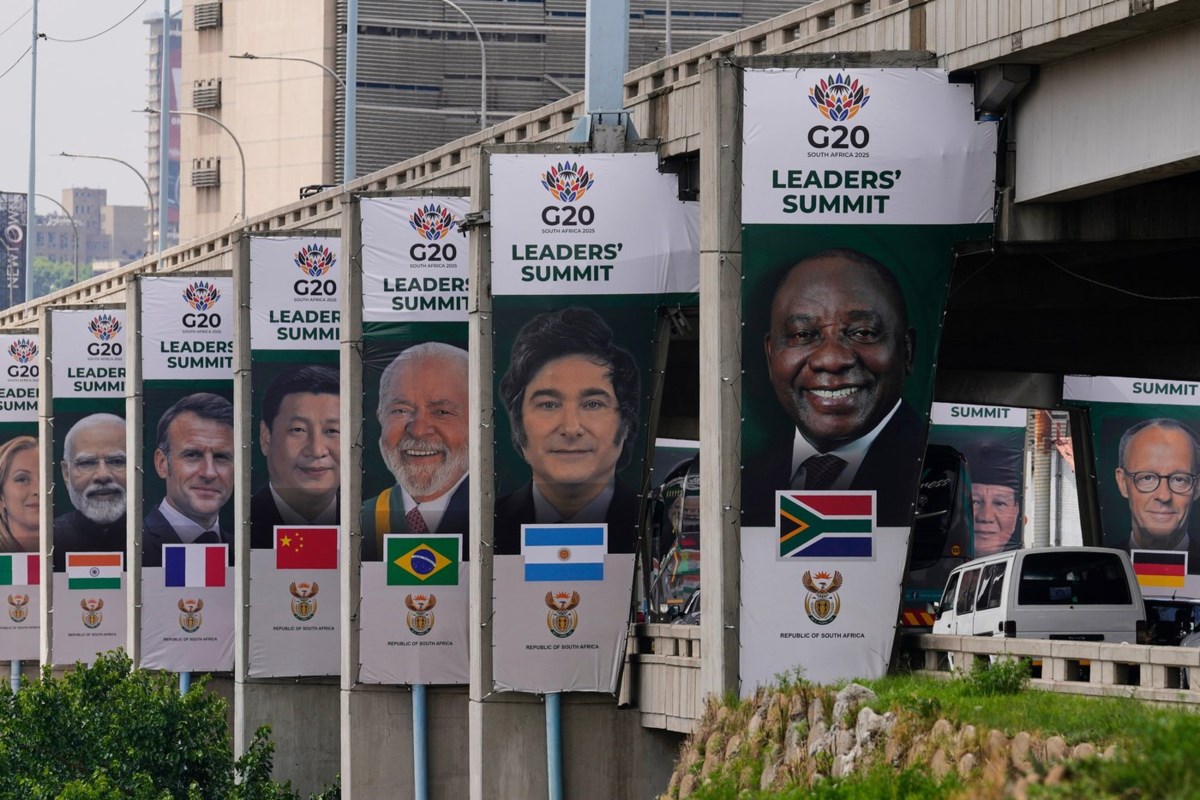Global leaders meeting in Johannesburg for the first-ever G20 Summit held on African soil adopted their final declaration on the opening day of deliberations, breaking from the long-standing tradition of concluding negotiations at the end of the summit. The declaration, endorsed on November 22, sets out commitments on energy access, debt sustainability, climate action and industrialization, signaling a coordinated shift by the world’s largest economies toward deeper engagement with Africa’s development priorities.

Banners with portraits of several world leaders on a road in Johannesburg, South Africa, on November 20, 2025, ahead of the G20 summit to be held there.
The early adoption was confirmed by South African Presidential Spokesperson Vincent Magwenya, who explained that negotiators had completed the work ahead of schedule and that leaders agreed to move the declaration to “the first order of the day.” According to Magwenya, the decision was deliberate: the host nation wanted the summit to focus less on procedural negotiations and more on practical cooperation, leaving room for Africa’s priorities, including energy security, trade, digital innovation and climate resilience, to shape the rest of the agenda. This shift allowed leaders to spend the two days examining implementation pathways rather than bargaining over language.
Read also: Malawi launches world’s first AI-verified paris agreement platform at COP30
The declaration stresses that holding the G20 Summit in Africa for the first time reflects a broader recognition that global challenges; energy shortages, financial instability, climate pressure and trade disruptions, cannot be solved without the continent’s leadership. The document anchors its vision in the principle of Ubuntu, arguing that stability and prosperity require cooperation built on shared responsibility.
Energy access emerged as one of the most urgent issues. With more than 600 million Africans still without electricity and close to a billion relying on biomass for cooking, leaders acknowledged that the continent’s development prospects depend on expanding access to affordable, reliable and clean power. They backed international commitments to triple global renewable energy capacity and endorsed Africa’s push for concessional financing, technology transfer and country-specific energy transition pathways. Mission 300, a joint initiative of the World Bank and African Development Bank to connect 300 million Africans to electricity by 2030, was welcomed as a major tool for turning these commitments into real infrastructure.
Energy security, the declaration notes, is directly tied to economic sovereignty. Leaders supported South Africa’s Voluntary Energy Security Toolkit, which provides a structured approach for countries to strengthen power systems, improve grid stability and build regional interconnections, critical for a continent where electricity gaps often undermine industrialization.
Debt sustainability remains a parallel challenge. The declaration points to rising borrowing costs, shrinking fiscal space and a sharp increase in interest payments across low-income economies. Many African countries now spend more on debt servicing than on education or health.
G20 members agreed to strengthen the Common Framework for debt treatment and improve creditor transparency. They also backed reforms at the IMF and World Bank to expand access to crisis-resilient debt clauses, climate-linked instruments and enhanced concessional windows. The creation of a 25th seat for Sub-Saharan Africa on the IMF Executive Board was highlighted as a step toward better representation of African interests within global financial governance.
Read also: COP30: 18 countries join new global coalition to standardize compliance on carbon markets
Climate action featured prominently. The declaration reaffirms support for limiting warming to 1.5°C and underscores the need for climate finance to rise from billions to trillions if developing countries are to meet their 2030 targets. Leaders emphasized the need for predictable financing to support Africa’s renewable energy expansion, resilience building and nature-based solutions. They also welcomed new initiatives on forest protection, biodiversity conservation and universal early-warning systems, citing South Africa’s launch of the UN-backed Early Warnings for All roadmap.
Industrialization was framed as essential to Africa’s long-term growth. Leaders endorsed the Critical Minerals Framework, aimed at helping resource-rich developing countries shift from raw mineral exports to local value addition. This includes strengthening environmental safeguards and improving governance to ensure that mineral wealth translates into inclusive development. The declaration also supports voluntary principles for developing sustainable industrial hubs, emphasizing job creation, labor rights and social protection.
Digital transformation and artificial intelligence drew significant attention. Leaders welcomed the launch of the AI for Africa Initiative, designed to expand Africa’s access to computing infrastructure, skilled talent and high-quality datasets. UNESCO’s new Technology Policy Assistance Facility will help African countries craft regulatory frameworks for AI deployment, while G20 members reaffirmed a commitment to close the gender digital divide and achieve universal meaningful connectivity by 2030.
The declaration also addresses food security, noting the sharp rise in global hunger and the disproportionate impact of food price volatility on African households. Leaders backed the Ubuntu Approaches on Food Security and Nutrition, pledging support for fertilizer production, agricultural modernization and intra-African trade under the AfCFTA.
As the summit closed, leaders stressed that adopting the declaration early freed space for deeper discussions on Africa’s place in global decision-making. They endorsed the G20 Finance Track Africa Engagement Framework to 2030 and launched the Ubuntu Legacy Initiative to accelerate cross-border infrastructure on the continent. With the African Union now a full G20 member, the Johannesburg summit affirmed that global governance must evolve to reflect Africa’s demographic, economic and environmental significance.
Read also: G20 and African states adopt joint communiqué on economic growth and job creation
The G20 will reconvene under the United States’ presidency in 2026, with leaders committing to carry forward a roadmap rooted in cooperation, sustainability and shared prosperity.
Engage with us on LinkedIn: Africa Sustainability Matters
Engage with us on LinkedIn: Africa Sustainability Matters




